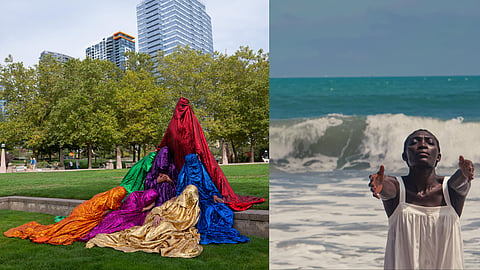Anida Yoeu Ali and Kamari Bright Won Artist Trust's 2024 Arts Innovator Award
Early last month, arts organization Artist Trust announced the winners of its Arts Innovator Award — Cambodia-born, Chicago-raised, Tacoma-based performance artist Anida Yoeu Ali and St. Louis-born, Seattle-based video and multidisciplinary artist Kamari Bright.
Funded by the Dale and Leslie Chihuly Foundation, the award specifically gives money to artists who are "originating new work, experimenting with new ideas, taking risks, and pushing the boundaries of their fields." Both Bright and Ali were selected by a board of multidisciplinary artists from around Washington State and each will be awarded $25,000 in unrestricted funds to go toward their work in whatever capacity they see fit.
"The first Arts Innovator Award was launched and the first awards were given in 2010," said Lydia Boss, program co-director at Artist Trust. "The focus of the grant is to support artists who are really taking risks in their practice, may not be receiving other support, and people who are doing things that are maybe more unconventional or underrecognized."
For an artist like Ali, this kind of funding is a lifeline. As a performance artist, her body is the primary medium that she uses to twist into different shapes, personas, and characters for each performance to explore the issues and themes on her mind. Born in Cambodia and raised in Chicago, her work often confronts marginalized bodies and identities, politics, Islamophobia, and gender roles. And currently, Ali has a huge exhibition, Hybrid Skin, Mythical Presence, up at the Seattle Asian Art Museum (you might have seen her performance of The Red Chador around the city last month).
Ali — a mother of three — doesn't have gallery representation or an agent, so most of the work that goes into being a professional artist, like coordinating shows or selling her work, falls on her own shoulders.
"My practice has had to take the shape of not busying away in a studio prolifically making work — that's not my practice. It's not true to who I am. It's not true to the fact that I work with such fragmented slots of time and with very little money," she said in a recent interview. Much of the money she's able to get through grants is then turned around to hire collaborators for her large-scale embodied works and on materials like tubing, wire, and textiles. For Ali, most of the money won't necessarily go into future projects, but rather toward paying off past projects.
"Honestly, [the funding] is going towards an incredible amount of debt that I accrued just to put on this huge exhibition at Seattle Art Museum. That's the ugly truth of what it means to be a visual artist in America trying to show at these big museums," said Ali. "I'm so glad that it's unrestricted because it gives me a chance to reduce my debt and not be tethered to financial hardship."
Similarly for Bright, much of her practice involves delving into her own pockets to create her evocative videopoetry. Concentrating on the experiences of the Black community, Bright explores healing, psychology, and growth through an interplay of poetry and imagery. Also without gallery representation, she calls herself "community taught" and has created work without a lot of formalized training. The vast majority of money for her projects come from self-funding and grants, so Bright says this announcement came as a positive "shock."
"This award I like to think of as rocket fuel. Because as someone who does self-funding for most of my works, if I don't have to do contract work to be able to fund my project, then it doesn't take me a year to get enough capital to pay for the things that I need for the project," Bright said. "[I have a] spreadsheet of ideas that now I can get into production."
Jas Keimig is a writer and critic based in Seattle. They previously worked on staff at The Stranger, covering visual art, film, music, and stickers. Their work has also appeared in Crosscut, South Seattle Emerald, i-D, Netflix, and The Ticket. They also co-write Unstreamable for Scarecrow Video, a column and screening series highlighting films you can't find on streaming services. They won a game show once.
Featured Image: Left: Anida Yoeu Ali's 'The Red Chador' performance in Bellevue. (Photo by Bruce Tom, courtesy of the artist). Right: A film still from Kamari Bright's When You Left Me, 2024 (courtesy of the artist).
Before you move on to the next story …
The South Seattle Emerald™ is brought to you by Rainmakers. Rainmakers give recurring gifts at any amount. With around 1,000 Rainmakers, the Emerald™ is truly community-driven local media. Help us keep BIPOC-led media free and accessible.
If just half of our readers signed up to give $6 a month, we wouldn't have to fundraise for the rest of the year. Small amounts make a difference.
We cannot do this work without you. Become a Rainmaker today!
Help keep BIPOC-led, community-powered journalism free — become a Rainmaker today.


